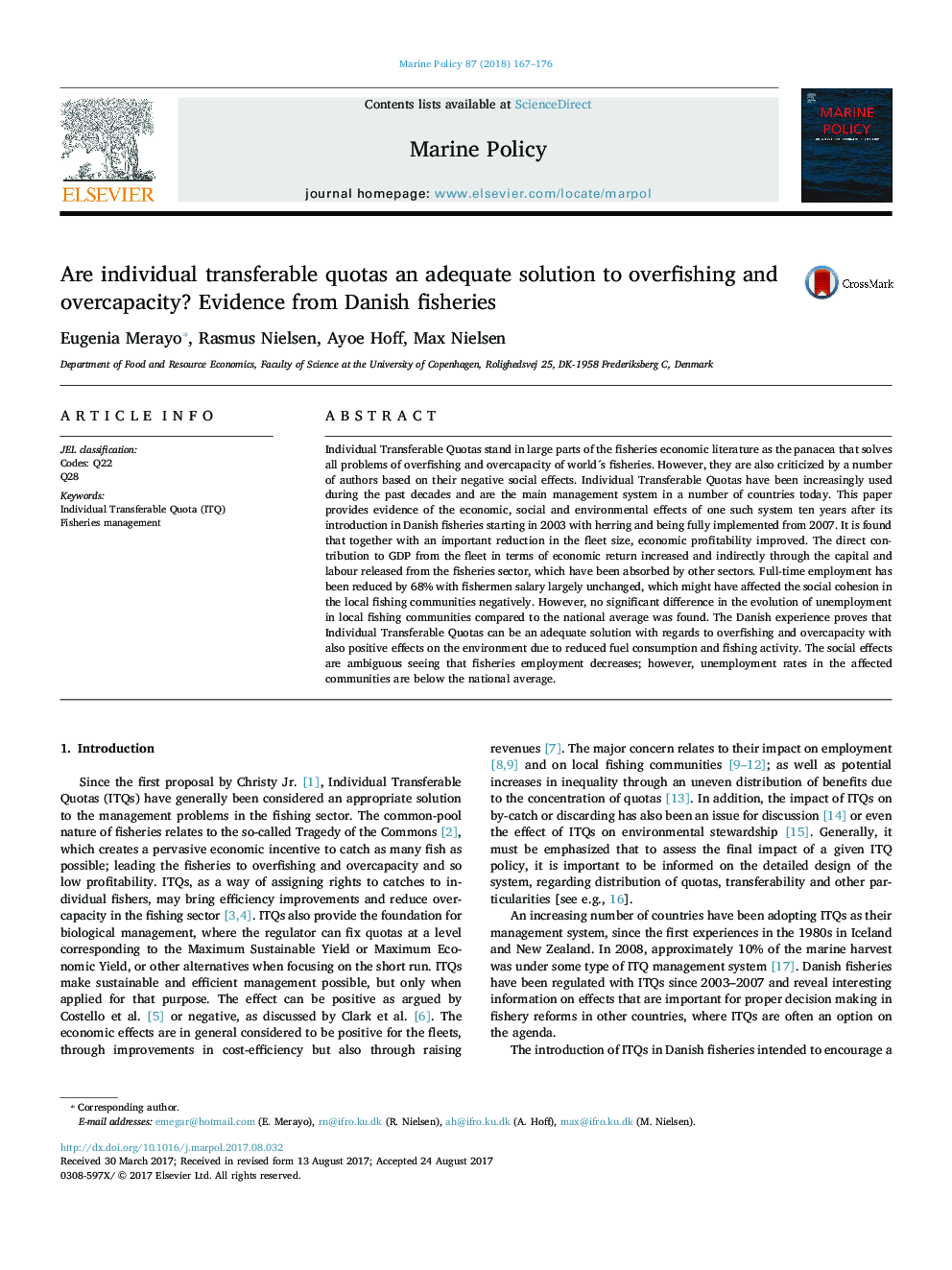| کد مقاله | کد نشریه | سال انتشار | مقاله انگلیسی | نسخه تمام متن |
|---|---|---|---|---|
| 7488457 | 1485492 | 2018 | 10 صفحه PDF | دانلود رایگان |
عنوان انگلیسی مقاله ISI
Are individual transferable quotas an adequate solution to overfishing and overcapacity? Evidence from Danish fisheries
ترجمه فارسی عنوان
آیا افراد قابل انتقال می توانند راه حلی مناسب برای بیش از حد ماهیگیری و ظرفیت بیش از حد باشند؟ شواهد از ماهیگیری دانمارکی
دانلود مقاله + سفارش ترجمه
دانلود مقاله ISI انگلیسی
رایگان برای ایرانیان
کلمات کلیدی
ترجمه چکیده
واحدهای قابل انتقال مجزا در بخش های بزرگی از ادبیات اقتصادی ماهیانه به عنوان پانزدهایی که حل همه مسائل مربوط به بیش از حد ماهیگیری و ظرفیت بیش از حد ماهیگیری در جهان است. با این حال، آنها نیز توسط تعدادی از نویسندگان بر اساس اثرات اجتماعی منفی آنها مورد انتقاد قرار می گیرند. در دهه های گذشته، واحدهای انتقال قابل مالحظه ای به طور فزاینده ای مورد استفاده قرار گرفته اند و امروزه در بسیاری از کشورها سیستم مدیریت اصلی هستند. این مقاله شواهدی از تأثیرات اقتصادی، اجتماعی و محیطی یک چنین سیستم را ده سال پس از معرفی آن در ماهیگیری دانمارکی که از سال 2003 با شاه ماهی آغاز شده است و به طور کامل از سال 2007 اجرا می شود، نشان می دهد. با توجه به کاهش قابل توجهی در حجم ناوگان، سودآوری اقتصادی بهبود یافته است. سهم مستقیم در تولید ناخالص داخلی از ناوگان از نظر بازده اقتصادی افزایش یافته است و به طور غیر مستقیم از طریق سرمایه و نیروی آزاد شده از بخش ماهیگیری، که توسط بخش های دیگر جذب شده است. اشتغال کامل تمام وقت با حقوق ماهیگیران 68٪ کاهش یافته است که ممکن است منافع اجتماعی در جوامع ماهیگیری محلی را تحت تاثیر قرار داده باشد. با این حال، تفاوت قابل ملاحظه ای در روند بیکاری در جوامع ماهیگیری محلی در مقایسه با میانگین ملی یافت نشد. تجربه دانمارک ثابت می کند که قواعد فرد قابل انتقال می تواند یک راه حل مناسب برای بیش از حد ماهی و بیش از حد ظرفیت و همچنین تاثیر مثبت بر محیط زیست به دلیل کاهش مصرف سوخت و فعالیت ماهیانه باشد. اثرات اجتماعی مبهم است زیرا کار اشتغالزایی کاهش می یابد؛ با این حال، نرخ بیکاری در جوامع آسیب دیده کمتر از میانگین ملی است.
موضوعات مرتبط
مهندسی و علوم پایه
سایر رشته های مهندسی
مهندسی دریا (اقیانوس)
چکیده انگلیسی
Individual Transferable Quotas stand in large parts of the fisheries economic literature as the panacea that solves all problems of overfishing and overcapacity of world´s fisheries. However, they are also criticized by a number of authors based on their negative social effects. Individual Transferable Quotas have been increasingly used during the past decades and are the main management system in a number of countries today. This paper provides evidence of the economic, social and environmental effects of one such system ten years after its introduction in Danish fisheries starting in 2003 with herring and being fully implemented from 2007. It is found that together with an important reduction in the fleet size, economic profitability improved. The direct contribution to GDP from the fleet in terms of economic return increased and indirectly through the capital and labour released from the fisheries sector, which have been absorbed by other sectors. Full-time employment has been reduced by 68% with fishermen salary largely unchanged, which might have affected the social cohesion in the local fishing communities negatively. However, no significant difference in the evolution of unemployment in local fishing communities compared to the national average was found. The Danish experience proves that Individual Transferable Quotas can be an adequate solution with regards to overfishing and overcapacity with also positive effects on the environment due to reduced fuel consumption and fishing activity. The social effects are ambiguous seeing that fisheries employment decreases; however, unemployment rates in the affected communities are below the national average.
ناشر
Database: Elsevier - ScienceDirect (ساینس دایرکت)
Journal: Marine Policy - Volume 87, January 2018, Pages 167-176
Journal: Marine Policy - Volume 87, January 2018, Pages 167-176
نویسندگان
Eugenia Merayo, Rasmus Nielsen, Ayoe Hoff, Max Nielsen,
